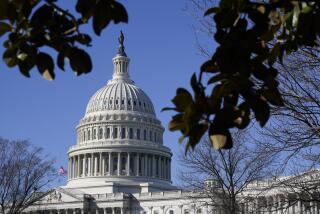What Harry Reid’s departure means to 2016 battle for Senate control
Harry Reid on Friday became the third Senate Democrat to announce plans to retire in 2016. But notably for his party’s chances of regaining the majority, his retirement is the first that clearly opens the door for a Republican pickup.
Republicans meanwhile have a number of incumbents likely to seek reelection in Democratic-leaning states, meaning control of the chamber could well flip again in 2016.
Here is an early look at what the Senate battleground map looks like.
DEMOCRATIC-HELD SEATS:
Colorado: Sen. Michael Bennet was a rare Democratic bright spot in the 2010 tea party wave, holding on to the seat he had been appointed to a year before. But with few other obvious Democratic incumbents to target, Republicans will devote significant effort to unseating Bennet, who had been the chairman of the Senate Democratic campaign committee in 2014.
Nevada: Republican Gov. Brian Sandoval’s easy reelection last November helped carry his party to victory in every other statewide race. But Sandoval himself has seemed uninterested in a move to Washington despite Republican efforts to recruit him into the race. A growing Latino population had boosted Reid and President Obama to victory here in the past, but the Democratic bench appears thin. The race is considered an early toss-up until candidates on both sides emerge.
California: Sen. Barbara Boxer was the first Democrat to announce retirement plans. But the early action has been all about which Democrat will replace her, given the dearth of viable options on the Republican side. Atty. Gen. Kamala Harris is seen as the early favorite, but Southern California Democrats, including a number of House members, are considering jumping in as well.
Maryland: The retirement of Sen. Barbara Mikulski, the longest-serving woman in the history of Congress, opens the door for a number of ambitious Democrats to claim a coveted Senate seat. Republicans won the governorship in the state in November in something of an upset, but the state still leans heavily Democratic.
REPUBLICAN-HELD SEATS
New Hampshire: First-term Sen. Kelly Ayotte is a top target for Democrats but has sought to quickly establish herself as a force in the Senate. The state’s popular Democratic governor, Maggie Hassan, is expected to run in what would immediately be one of the top 2016 races.
Illinois: Mark Kirk claimed what had been Barack Obama’s Senate seat in 2010, and Democrats are eager to take it back. Kirk has said he will run for reelection despite his ongoing recovery from a massive stroke in early 2012. Rep. Tammy Duckworth (D) is one early leading Democratic candidate.
Florida: Marco Rubio is more likely to run for president than for reelection, and the GOP field is frozen until he decides. Democratic Rep. Patrick Murphy said this week he will run, giving the party an early strong option. The Sunshine State will likely be a major battleground in the presidential and Senate elections.
Wisconsin: Republican Ron Johnson epitomized the tea party wave of 2010 when he defeated incumbent Sen. Russ Feingold. Feingold is now running to win this seat back, and the presidential-level turnout should help Democrats make a stronger fight.
Pennsylvania: In an increasingly Democratic-tilted state, Sen. Pat Toomey is girding for a fight. Democrat Joe Sestak, who lost to Toomey in 2010, is running again, but other Democrats could enter as well.
Ohio: Like Florida, Ohio could be a battleground for president and Senate. Rob Portman easily won his seat in 2010 but will face a strong challenge from former Ohio Gov. Ted Strickland. One wild card: Portman is seen as a possible vice presidential choice for whichever Republican secures the presidential nomination.
Indiana: Sen. Dan Coats announced his retirement this week, likely setting off a wide-open race for the GOP nomination in a state that has tilted strongly toward Republicans. But Democrats say they expect to mount a serious challenge. Obama won this state in 2008, and Democrat Joe Donnelly won an open Senate race here in 2012.
Close calls: At this early stage Republican incumbents appear well-positioned in Alaska, Missouri, Georgia and North Carolina. But the races could become more competitive based on factors including potential GOP primary challenges, strong Democratic candidate recruitment, and the potential strength of a Hillary Clinton candidacy at the top of the ballot.
More to Read
Get the L.A. Times Politics newsletter
Deeply reported insights into legislation, politics and policy from Sacramento, Washington and beyond. In your inbox three times per week.
You may occasionally receive promotional content from the Los Angeles Times.







